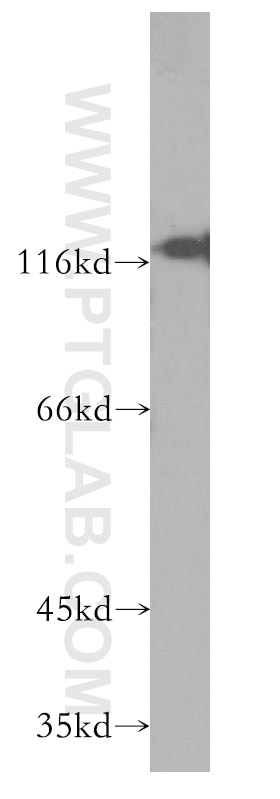Tested Applications
| Positive WB detected in | BXPC-3 cells |
Recommended dilution
| Application | Dilution |
|---|---|
| Western Blot (WB) | WB : 1:200-1:1000 |
| It is recommended that this reagent should be titrated in each testing system to obtain optimal results. | |
| Sample-dependent, Check data in validation data gallery. | |
Product Information
60185-1-Ig targets CD138/Syndecan-1 in WB, ELISA applications and shows reactivity with human samples.
| Tested Reactivity | human |
| Host / Isotype | Mouse / IgG1 |
| Class | Monoclonal |
| Type | Antibody |
| Immunogen | CD138/Syndecan-1 fusion protein Ag0823 Predict reactive species |
| Full Name | syndecan 1 |
| Calculated Molecular Weight | 32.5 kDa |
| Observed Molecular Weight | 120 kDa |
| GenBank Accession Number | BC008765 |
| Gene Symbol | CD138 |
| Gene ID (NCBI) | 6382 |
| RRID | AB_10859833 |
| Conjugate | Unconjugated |
| Form | Liquid |
| Purification Method | Protein G purification |
| UNIPROT ID | P18827 |
| Storage Buffer | PBS with 0.02% sodium azide and 50% glycerol , pH 7.3 |
| Storage Conditions | Store at -20°C. Stable for one year after shipment. Aliquoting is unnecessary for -20oC storage. 20ul sizes contain 0.1% BSA. |
Background Information
Syndecan-1 (SDC1), also named CD138, is an integral membrane protein. It participates in cell proliferation, cell migration and cell-matrix interactions via its receptor for extracellular matrix proteins. It is a heparan sulfate proteoglycan expressed on the surface of, and actively shed by, myeloma cells. Altered syndecan-1 expression has been detected in several different tumor types. SDC1 was regarded as a useful marker for labeling normal and neoplastic plasma cells and plasmacytoid lymphomas.
Protocols
| Product Specific Protocols | |
|---|---|
| WB protocol for CD138/Syndecan-1 antibody 60185-1-Ig | Download protocol |
| Standard Protocols | |
|---|---|
| Click here to view our Standard Protocols |



